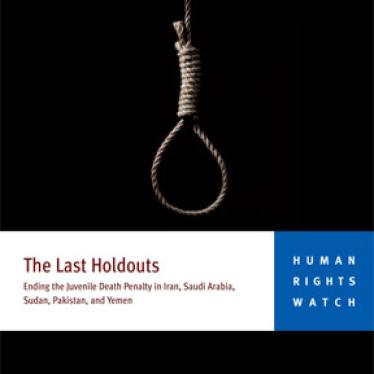(New York, November 4, 2008) - Iran hanged a juvenile offender on October 30, 2008, the seventh this year, only two days after Iranian authorities "categorically denied" that it still executes juveniles, the International Campaign for Human Rights in Iran and Human Rights Watch said today. Both organizations appealed to Iranian authorities to end such executions immediately.
Iran is the only country to have executed juvenile offenders so far this year. It also leads all countries of the world in executing juvenile offenders, accounting for more than 80 percent of (or 27 of 33) such executions during the past three and a half years. At least 130 juvenile offenders are on death row in Iran.
"It is tragic that Iran is continuing to kill juvenile offenders," said Clarisa Bencomo, Middle East children's rights researcher at Human Rights Watch. "Iran urgently needs to end its isolated position and abolish these executions."
On October 30, the judicial branch of Isfahan province in Iran announced it had carried out that morning the death sentence of Gholamreza H., an Afghan national convicted of murder. The news release posted on its web site said that Gholamreza H. was 19 years old at the time of his execution and had been convicted of a murder committed on November 20, 2006, when he was 17.
Iranian officials repeatedly have denied executing juvenile offenders, most recently on October 28, in a statement at the United Nations during discussions of the UN secretary-general's reports on the death penalty and on Iranian human rights abuses. Earlier in October, as the UN held its annual debate on the rights of the child, a senior official in Iran's Judiciary announced a directive commuting death sentences for all juvenile offenders. Three days later, the same official told the Associated Press that the directive would only apply to narcotics cases and would not affect any of the juvenile offenders currently on death row.
"These announcements appear to be little more than a smoke screen issued when Iran's human rights record is debated before the UN," said Hadi Ghaemi, coordinator of the International Campaign for Human Rights in Iran.
The International Campaign for Human Rights in Iran and Human Rights Watch oppose capital punishment in all circumstances as a violation of the right to life and because of its cruel and inhumane nature. In particular, in imposing death sentences on people for crimes committed before the age of 18, Iran flouts clear and specific human rights obligations. The imposition of the death penalty for such offenses is prohibited under two major human rights treaties that Iran has ratified - the International Covenant on Civil and Political Rights, and the Convention on the Rights of the Child.
The groups called on Iran to halt immediately any plans to carry out death sentences for persons who were under 18 at the time of the offense, to legislate abolition of the death penalty for juvenile offenders in all cases, and to respect its international human rights obligations.






